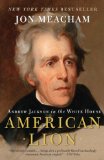Summary | Excerpt | Reviews | Readalikes | Genres & Themes | Author Bio

Critics' Opinion:
Readers' Opinion:
First Published:
Nov 2008, 512 pages
Paperback:
Apr 2009, 512 pages
No matter how many of these words were hers, and how many were created by Jackson and ascribed to her memory, Elizabeth Jackson cast a long shadow in the life of her only surviving son.
Jackson spiraled downward and lashed out in the aftermath of his mother’s death. Before now, living in other people’s houses, Jackson had learned to manage complicated situations, maneuvering to maintain a passably cheerful (and grateful) face among people who gave him shelter but apparently little else. “He once said he never remembered receiving a gift as a child, and that, after his mother’s death, no kind, encouraging words ever greeted his ear,” recalled Mary Donelson Wilcox.
The Revolutionary War drew to a close with the American victory at Yorktown, Virginia, on the afternoon of Friday, October 19, 1781. Two years later, on Wednesday, September 3, 1783, came the Treaty of Paris, and the United States was now an independent nation. For Jackson, though, the end of war brought little peace. Living for a time with some Crawford relatives, Jackson got into a fight with one of their guests, a Captain Galbraith. Jackson thought him “of a very proud and haughty disposition,” and the two found themselves in an argument, and “for some reason,” Jackson recalled, “I forget now what, he threatened to chastise me.” Jackson replied with a flash of fire. “I immediately answered, ‘that I had arrived at the age to know my rights, and although weak and feeble from disease, I had the courage to defend them, and if he attempted anything of that kind I would most assuredly send him to the other world.’” That was enough for Jackson’s current Crawford host to shuffle him off to another relative. Having the unstable orphan around presented too many problems, not least the possibility of his attacking other guests.
Then came a crucial interlude in Jackson’s life: a sojourn in the cultivated precincts of Charleston. He had come into some money–either from his grandfather or perhaps from the sale of his mother’s property–and used it to finance a trip to the coast where he fell in with a fast, sophisticated circle. Some Charlestonians had retreated to the Waxhaw region during the worst of the fighting on the coast, so Jackson had something of an entrée when he arrived. Here he found the pleasures of the turf, of good tailors, and of the gaming tables. “There can be little doubt that at this period he imbibed that high sense of honour, and unstudied elegance of air for which he has been since distinguished,” wrote the early Jackson biographer Henry Lee–as well as little doubt that his love of racehorses and fine clothes had its beginnings in Charleston, too.
After Jackson returned to Waxhaw, he grew restless. From 1781 to 1784, he tried his hand at saddle making and school teaching–neither seems to have gone very well–and then left South Carolina for good. For the rest of his life, for a man who adored talk of family, friends, and old times, Jackson mentioned Waxhaw very little, the only exceptions being conversation about his mother and about Revolutionary War action in the region–both things that he could claim as his own.
Decade after decade, he never chose to find the time to go to Waxhaw. Acknowledging the gift of a map of the region the year before he was elected president, Jackson wrote a well- wisher: “A view of this map pointing to the spot that gave me birth, brings fresh to my memory many associations dear to my heart, many days of pleasure with my juvenile companions”–words that might, taken alone, suggest warm memories of his frontier youth.
Referring to his “juvenile companions,” Jackson said, “but alas, most of them are gone to that bourne where I am hastening and from whence no one returns”–in other words, they were dead. “I have not visited that country since the year 1784,” he added–which, since he was writing in midsummer 1827, means that forty- three years had passed since he bothered to return. Turning as close to home as he could, Jackson concluded: “The crossing of the Waxhaw creek, within one mile of which I was born, is still, however, I see, possessed by Mr John Crawford, son of the owner (Robert) who lived there when I was growing up and at school. I lived there for many years, and from the accuracy which this spot is marked in the map, I conclude the whole must be correct.” With that Jackson signs off. The subject is closed.
Excerpted from American Lion by Jon Meacham Copyright © 2008 by Jon Meacham. Excerpted by permission of Random House, a division of Random House, Inc. All rights reserved. No part of this excerpt may be reproduced or reprinted without permission in writing from the publisher.





The House on Biscayne Bay
by Chanel Cleeton
As death stalks a gothic mansion in Miami, the lives of two women intertwine as the past and present collide.

The Flower Sisters
by Michelle Collins Anderson
From the new Fannie Flagg of the Ozarks, a richly-woven story of family, forgiveness, and reinvention.

The Funeral Cryer by Wenyan Lu
Debut novelist Wenyan Lu brings us this witty yet profound story about one woman's midlife reawakening in contemporary rural China.
Your guide toexceptional books
BookBrowse seeks out and recommends the best in contemporary fiction and nonfiction—books that not only engage and entertain but also deepen our understanding of ourselves and the world around us.